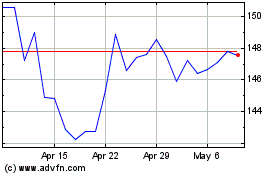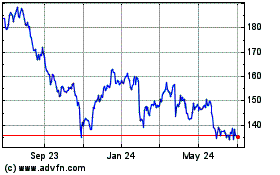UPS to Sell Freight Trucking Business to TFI for $800 Million
January 25 2021 - 12:09PM
Dow Jones News
By Jennifer Smith and Paul Ziobro
United Parcel Service Inc. agreed to sell its freight business
to rival TFI International Inc. for $800 million, saying it is
pulling out of the domestic trucking market to focus on the soaring
small package-delivery business.
The sale is one of the biggest strategic shifts by new Chief
Executive Carol Tomé since she took the position last June. She has
adopted a mantra of "better, not bigger" in assessing UPS's
operations, and jettisoning the freight business eliminates future
capital investments needed to keep the division competitive.
The agreement announced Monday would allow the business to
continue using UPS's domestic package network for five years to
fulfill shipments. TFI, which is based in Canada, provides similar
freight trucking services, as well as logistics services and parcel
shipping in Canada.
UPS Freight offers less-than-truckload services, in which cargo
from multiple shippers is combined in a single trailer, in all 50
states, Canada and Mexico. The business has about 14,500 employees,
80% of whom are full-time, UPS said.
The unit is the sixth-largest carrier by revenue in the U.S. LTL
market, behind carriers including FedEx Corp.'s FedEx Freight unit
and Old Dominion Freight Line Inc., according to SJ Consulting. UPS
Freight generated an estimated $3.15 billion in 2020 revenue, down
slightly from 2019, according to UPS. TFI, which has truckload,
less-than-truckload and logistics operations, reported revenue of
about $4.1 billion in 2019.
UPS on Monday said it expects to book a noncash impairment
charge of roughly $500 million before taxes for 2020. The deal is
expected to close in the second quarter.
UPS moved into the trucking market with its acquisition in 2005
of Overnite Corp. for $1.25 billion, then its largest-ever
acquisition. It said it decided to sell the business after
assessing its portfolio, enabling it to pay down long-term debt.
The delivery giant said it would retain historical pension assets
and liabilities, while pension benefits earned after closing will
be TFI's responsibility.
UPS and rival FedEx have faced huge increases in shipping volume
during the pandemic, as consumers have ordered everything from
their essential goods like toothpaste and toilet paper to bulky
items to outfit home offices and outdoor play sets. The carriers
have raised shipping rates and added new surcharges to offset the
higher costs, but it has had little effect in slowing demand for
online buying.
"As more and more parcel goes B2C [business-to-consumer], the
bundling with freight and parcel is less relevant," said Satish
Jindel, president of research firm SJ Consulting Group Inc. UPS's
freight "is mostly industrial and manufacturing."
The acquisition leaves UPS rival FedEx, whose FedEx Freight unit
has better operating margins than UPS Freight, as the biggest major
parcel shipper with a less-than-truckload operation, Mr. Jindel
said.
The Teamsters union represents some 11,000 UPS Freight workers
who ratified a five-year contract with the company in late
2018.
Write to Jennifer Smith at jennifer.smith@wsj.com and Paul
Ziobro at Paul.Ziobro@wsj.com
(END) Dow Jones Newswires
January 25, 2021 11:54 ET (16:54 GMT)
Copyright (c) 2021 Dow Jones & Company, Inc.
United Parcel Service (NYSE:UPS)
Historical Stock Chart
From Mar 2024 to Apr 2024

United Parcel Service (NYSE:UPS)
Historical Stock Chart
From Apr 2023 to Apr 2024
